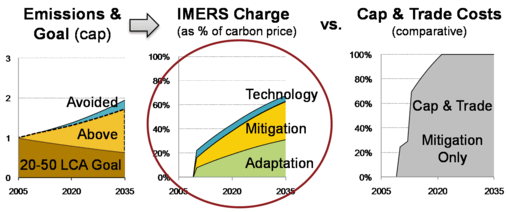Scheme Costs
Minimizing costs is crucial as international transport is key for trade and sustainable development. IMERS, a cap-and-charge scheme, will be significantly cheaper than cap-and-trade.
Selecting an ambitious yet affordable scheme & cap

Importantly, IMERS will simultaneously deliver significant innovative financing for adaptation to climate change in developing countries and financing for technology R&D and transfer!
The proposed scheme is economically efficient and operational costs are kept low thanks to a centralized approach. The overall impact on end user prices is estimated at $1 for $1,000 of imported goods, i.e. around 0.1% (equivalent to increase of shipping costs by around 3%).
This is contrasted with the high costs for a hypothetical Cap-and-trade for shipping. For the above comparison, we have used the just announced parameters for the EU ETS for 2013-2020 (see section on Auctioning: 60% auctioning from 2013 onwards, etc).
The level of charge depends on ambition defined by a notional emission cap. Even for an ambitious 20-50 cap from 2005 the IMERS approach is easily affordable while delivering mitigation, adaptation and technology funding (as shown above).
IMERS Cost Impact
We calculate that using a harmonized charge of under $10/tCO2, would suffice from 2010-2012 (equivalent to 30% of the forward carbon price of around $30/tCO2). This translates to $30/ton of fuel.
Detailed cost calculations and impact are provided in the table below for charges as % of carbon (CO2) market price, and impact on: fuel prices, shipping costs, and end customer.
|
Year |
% of C$ |
$/t fuel* |
Shipping $ |
Customer |
|
2012 |
30% |
$27 |
2% |
< 0.1% |
|
2020 |
46% |
$42 |
3% |
< 0.1% |
|
2035 |
70% |
$64 |
5% |
< 0.2% |
*For market data: $30/tCO2, $500 t/HFO.
Finally, administrative costs for the participating ship managers is very low. The total reporting effort is expected to be under 20 minutes per month for the submission of a consolidated report on fuel used by all the ships under management. If that approach proved unworkable for some ship managers or sections of shipping, an alternative approach based on the Bunker Delivery Notes (as required by MARPOL Annex VI) will also deliver low cost.
In summary, the hybrid scheme can be ambitious and affordable, while being achievable in short-term.
